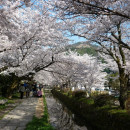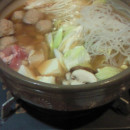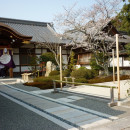Japan and KCJS: They are what you make of them! Past Review
By Mary R (Barnard College) - abroad from 01/11/2012 to 04/26/2012 with
Columbia University: Kyoto - Kyoto Consortium for Japanese Studies / KCJS
Amazing memories, great friends, and a ton of new kanji! Definitely worth it!
Review Photos



Personal Information
| If you took classes at multiple universities, list those universities here: | Doshisha University |
| How much international exposure did you have prior to this program? | 6 months+ |
Review Your Program
|
* Overall educational experience
Academic rigor, intensity, resources, etc. |
I would give the Japanese language classes five stars without a doubt. I learned a TON. That being said I have never had so much language homework in my LIFE. Up to 4 hours per night and 20 new kanji plus their compounds amounting to about 45 vocab words a day. That being said, (depending on the course you took) the afternoon classes could be quite a breeze. The courses I took (Medieval Kyoto, Medieval Japan; Politics and Political Economy of Japan) had a fair amount of reading but it was all pretty much *optional*. One class had 3 4-page papers which were basically reading reviews, the other required every student to lead one class discussion, one field trip (awesome field trips btw), and write a final 8-10 page paper. Easy peasy. All the teachers were helpful and more importantly, WANTED to help you. I think the Japanese professors in particular were stellar (if strict). |
|
* Host Country Program Administration
On-site administration of your program |
Very efficient and helpful. Always eager to answer your questions or work towards a solution together. |
|
* Housing:
How satisfied were you with your living arrangements? |
I LOVED my homestay family. I had friend who chose to stay in an apartment and though they enjoyed to freedom to come and go as the pleased, all expressed a bit of regret that they hadn't lived with a family. It was the best way to learn and practice Japanese as well as experience hands-on Japanese culture and society. I even learned Japanese recipes! I'm returning to Japan for an internship this summer and I plan to stay with them for a few days. In short, as tempting as an apartment may sound, it means you have to pay for and cook all of your meals (host families were given a monthly stipend for our breakfast and dinner) and can't immerse as fully in Japanese society. I wholeheartedly urge anyone to live with a family. |
| * Food: |
I loved the food my host family served (which was actually largely Japanese takes on Western food, interspersed with straight-up Japanese food), but after a while I seriously craved variety and some spice. Japanese food is pretty mild (and I don't just mean in terms of heat, but their use of flavorful spices) and can get...well, a little dull. There's only so much ramen I can eat. Still, I was never hungry and my family delighted in giving me new and sometimes crazy things to try. Have fun with it! You can always get pizza when you get home. (Tip: Avoid Japanese pizza at all costs: it is a crime against humanity) |
|
* Social & Cultural Integration:
How integrated did you feel with the local culture? |
Aside from the fact that I did get a few stares (especially from drunken salary-men on the late-night trains) and the odd bit of blatant discrimination, my family and Japanese friends made me feel right at home. Japanese society is not an easy one to merge into, due to their feeling of being one homogeneous group (not actually the case); this was compounded by being a blonde woman from America. Still, everyone was for the most part nice. The old ladies LOVED it when all the gaijin dressed in kimono and walked around the city; we got some great compliments! |
|
* Health Care:
How well were health issues addressed during the program? |
I never got sick and from the experience a friend had, that was a great thing. She was sick with flu-like symptoms for a day and the Japanese staff and her family FLIPPED out. She was quarantined in her room for a week even though she got better the next day and the doctor said it only might be the flu. Worst part: KCJS has a ridiculous sick-leave policy wherein even if you miss class for an illness and have a doctor's note, you get a zero for every day missed. Not just an excused absence, a ZERO. Which is completely illogical seeing as the staff was urging (and in her case, forcing) us to stay home at the first sign of an illness. Completely unfair. However, the director who began last year plans to get rid of this policy. |
| * Safety: |
Japan is pretty safe. Not as safe as they claim, but I never felt in danger. I didn't particularly like walking home from the train station by myself late at night after I missed to last bus, but I was never in any danger. |
| If you could do it all over again would you choose the same program? |
Yes
|
Finances
|
* Money: How easily were you able to live on a student's budget?
(1 = not very easy/$200+ on food & personal expenses/week, 2.5 = $100/week, 5 = very easily/minimal cost) |
It may be just me, or maybe its the crazy prices in Japan (6 USD for a tall at Starbucks...), but I was constantly broke. But, this was due in large part to me enjoying my time in Japan fully. Nights out are not cheap, but when you look back on your time abroad, they are totally worth it. |
| * Was housing included in your program cost? | Yes |
| * Was food included in your program cost? | Yes |
| Not including program expenses, about how much money did you spend on food and other expenses each week? | 80 USD during a good week; 150 during a bad one |
| Do you have any general money-saving tips for future study abroad participants? | Eat at the school cafeteria and DON'T go to the combini (convenience store) every day. The cafeteria isn't exactly high cuisine but its cheap (300 JPY a meal). |
Language
| * Did your program have a foreign language component? | Yes |
|
How much did the program encourage you to use the language?
0 = No encouragement, 5 = frequent encouragement to use the language |
They had us sign a contract saying we would use only Japanese both inside and outside of the classroom (except for during afternoon classes that were taught in English). The outside of the classroom bit was definitely a little optimistic. Most of us just reverted to English when with one another (didn't dare do it in front of the Japanese teachers though). Some students did follow the rue and benefited from it, so maybe I should have made a bit more of an effort... |
| How would you rate your language skills at the beginning of the program? | Intermediate |
| How would you rate your language skills at the end of the program? | Advanced |
| What was the highest level language course you had completed prior to departure? | 3rd Year Japanese |
| How many hours per day did you use the language? | |
| Do you have any tips/advice on the best ways to practice the language for future study abroad participants? | Homestay family! |
Other Program Information
|
* Where did you live?
Select all that apply |
|
|
* Who did you live with?
Select all that apply |
|
|
* Who did you take classes with?
Select all that apply |
|
| About how many local friends did you make that you will likely keep in touch with? |
A Look Back
| * What did you like most about the program? |
|
| * What could be improved? |
|
| * What do you know now that you wish you knew before going on this program? | Save more money! |
Individual Course Reviews
| Course Name/Rating: |
Japanese |
| Course Department: | Japanese |
| Instructor: | Fukai and Nishimata |
| Instruction Language: | Japanese |
| Comments: | Very challenging; I learned SO much. This knowledge came at a price though. Every night we had about 3 to 4 hours of homework not to mention the 40+ kanji/compounds/vocabulary we had to memorize every day. This means a LOT less time to spend exploring or bonding with your homestay family. To me, living with a real Japanese family was the most important aspect of my learning Japanese and about Japanese culture and was the most fulfilling part so I really hated having to rush through dinner so I could run upstairs, shut myself in my room and work. To me, the point of studying abroad is not simply to have your head in the books in a different country, but to EXPERIENCE that country. Sorry to wax poetic (read: complain) but this is one aspect of the program that truly frustrated me. I guess I did learn a lot though... |
| Credit Transfer Issues: |
| Course Name/Rating: |
Medieval Kyoto, Medieval Japan |
| Course Department: | History |
| Instructor: | Prof. McClain |
| Instruction Language: | English |
| Comments: | Not super challenging but highly engaging and enormously enjoyable. I had previously taken courses in Japanese history so this course (which was a discussion/theme-based course, definitely not a survey) was mush easier to follow and more rewarding. Light on the coursework, just reading mostly, about 150 pg/week. Grade: 50% Class participation (SERIOUSLY) 25% Final 8-10 page term paper 25% One in-class discussion leader and one field trip leader |
| Credit Transfer Issues: |
| Course Name/Rating: |
Politics and Political Economy of Japan |
| Course Department: | Economics |
| Instructor: | Prof. Weathers |
| Instruction Language: | English |
| Comments: | This course could have been really amazing. Which is not to say that I didn't enjoy it and learn a great deal, it just felt like the course was being hindered by the manner in which it was conducted. Students would be assigned to present on a reading for each class (about 3 or 4 presenters per class), but this basically meant a 30-minute summation of readings we were supposed to have already done. It didn't help that the course met on Wednesdays from 3:00 to 6:15 PM, a long time after a long day of classes so there was a good deal of spacing out. I enjoyed the subject matter and you could tell the professor did too. We unfortunately didn't get to go on any field trips (Tokyo would probably have been a better location for that anyways), but he did bring in officials from Japanese unions to speak and answer our questions which was really interesting. Looking back I wish we could have utilized resources from outside of the class more and that the format was more organized and less based on presentations. Workload: 150ish pages per week (largely optional) 3 reading presentations (basically summations if done poorly) 1 group presentation on a social/economic issue not discussed in class 3 4-5 page papers |
| Credit Transfer Issues: |








